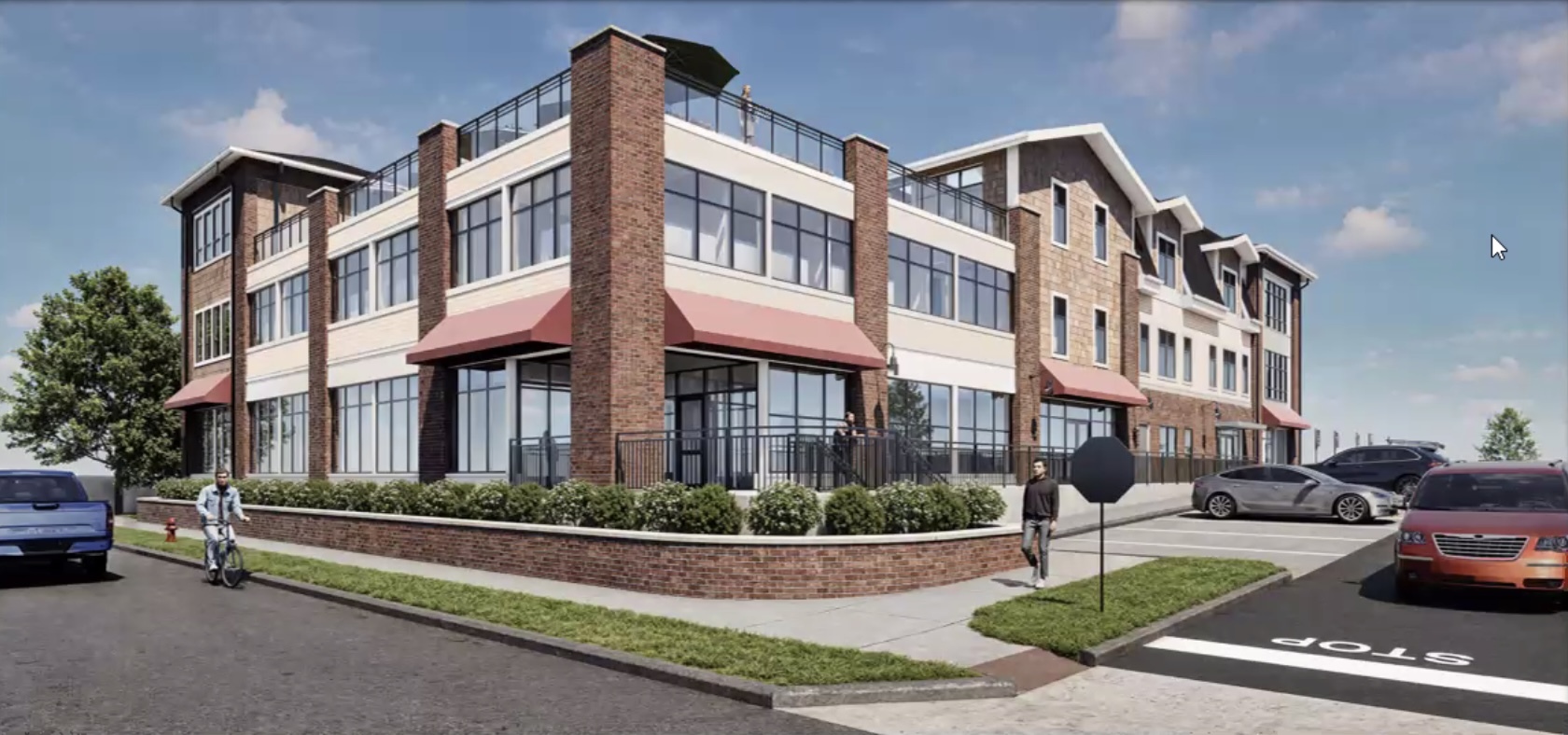
Rendering of the proposed clinic.

A moment in the four hours of passionate Zoom talk preceding Tuesday night's votes.
After hours of impassioned testimony from Hill neighbors, the City Plan Commission voted Tuesday night to reject the APT Foundation’s proposal to build a 40,000-square-foot methadone clinic on Sargent Drive in New Haven’s Long Wharf Gateway District.
Commissioners took the vote following a prolonged debate over whether the waterfront site aligns with the city’s long-term development goals.
The vote dealt a setback to the APT Foundation’s plan to relocate its methadone clinic from Congress Avenue in the Hill neighborhood to a newly proposed facility on the other side of I‑95 from the waterfront.
With the plan now halted at the commission level, the clinic will remain at its current location for the foreseeable future — unless the Board of Alders chooses to override the commission’s recommendation.
Commissioners voted to deny three key components of the project: A special permit to operate a healthcare clinic in the Long Wharf mixed-use zone, a permit to exceed parking limits, and the site plan itself.
They also unanimously recommended that the Board of Alders reject the related Development and Land Disposition Agreement (DLDA) for the property transfer. The proposal will now head to the full Board of Alders for a final vote, with the commission’s recommendation to deny in hand.
That vote capped a night of sharply divided testimony from city officials, residents, and political candidates lasting four hours over Zoom. The hearing reflected not only disagreement over the clinic itself, but also deeper questions about the future of Long Wharf, neighborhood equity, and New Haven’s development priorities.
The proposed facility, a three-story, 40,500-square-foot building at 60 Sargent Dr. (the parcel’s official address is 0 Sargent Dr.) where Gateway Community College used to have a campus, would include administrative offices, counseling rooms, an outpatient clinic, a pharmacy, and 99 on-site parking spaces. Each floor would span approximately 13,500 square feet, and the structure, along with its parking layout, was designed to meet all applicable setback regulations and lot coverage requirements.
Supporters of the plan, including city officials, framed the new facility as a critical improvement over the clinic’s current location — both in design and in context.
At Tuesday’s hearing, Hill Alder Angel Hubbard — who represents the area currently hosting the Congress Avenue clinic — urged commissioners to support the relocation. She called the current site, located near a pre‑K – 8 school and surrounded by homes, inappropriate for addiction treatment services. She praised the proposed Long Wharf location as a safer and more secure alternative.
“It’s almost like you’re buying a new house from your old apartment,” Hubbard said. “You don’t look at what you just left, you always look at the new elevation.”
The project met strong resistance from other officials and residents, particularly those representing or living near Long Wharf.
Hill Alder Carmen Rodriguez, whose district includes the proposed site, argued the APT Foundation had failed to engage with the neighborhood and cited a track record of loitering and public disruptions near its current locations.
Hill Alder Kampton Singh echoed those concerns, saying that Long Wharf should be reserved for economic development and that APT could explore sites in nearby towns where it already operates.
“This is not about treatment,” he said. “Long Wharf is not the place for this clinic.”
Miguel Pittman, a Hill homeowner, business owner, and candidate running against Hubbard for Ward 3 alder, also urged a no vote. He described the relocation as a land-use issue and warned it would undermine Long Wharf’s potential as a driver of tourism and commercial growth.
APT Foundation CEO Lynn Madden and architect Joe Williams, and city economic development chief Mike Piscitelli argued that the new facility would consolidate services, improve patient outcomes, and reflect best practices in public health infrastructure. They pointed to amenities such as flood mitigation features, green infrastructure, and easy transit access, as well as a design intended to create a discreet and welcoming environment.
City Deputy Economic Development Director Aya Beckles-Swanson also spoke in favor, highlighting the DLDA’s local hiring goals and the city’s broader equity priorities. She emphasized that relocating the clinic would move essential services out of a residential area and into a purpose-built facility better suited for public health delivery.
“If you are speaking out because of objections to the location on Congress Avenue,” she said, “then you should be in favor of this plan, because the alternative is that the location remains on Congress Avenue.”
Despite that support, most public commenters opposed the project. Long Wharf and Hill South residents voiced concerns about public safety, loitering, and what they described as a lack of oversight at APT’s existing sites. Angela Hatley, a Greenwich Avenue resident, argued the proposed site is valuable waterfront property and should not be used for a tax-exempt facility. “Our issue is economics,” she said. “We’re taxpayers, and we’re holding down the burden.”
Former city Youth Director Jason Bartlett also urged rejection, saying the plan violates the city’s Long Wharf Responsible Growth Plan and ignores both best planning practices and community input. “The administration decided Long Wharf wasn’t a neighborhood, so they didn’t have to listen,” he argued.
The proposal emerged as a flashpoint in this year’s mayoral race. Mayor Justin Elicker has voiced support for the relocation, defending his administration’s tentative agreement with APT as a way to move treatment services out of a residential area and into a more appropriate facility. Under the deal, APT would close its Congress Avenue clinic and open a new headquarters on the property on Sargent Drive.
Republican challenger Steve Orosco has taken the opposite position. While he agrees the clinic should leave Congress Avenue, he has argued that Long Wharf should be reserved for commercial development, not high-impact social services. In a recent Instagram post, he described the site as one of the city’s most valuable economic zones.
The final vote reflected the commission’s broad disapproval. The special permit to operate a healthcare clinic was denied 4 – 1, with only Commissioner Adam Marchand voting in favor.
Marchand acknowledged community concerns but said the vacant lot could benefit from responsible redevelopment.
“If it’s a really well-run place,” he said, “people might not even know what’s going on in there.”
Commissioner Leslie Radcliffe voted no, citing APT’s poor management at existing sites and the project’s incompatibility with the city’s development goals. She said the clinic would harm economic growth and fail to serve the broader community.
The full vote breakdown showed a clear majority against the proposal. Commissioner Adam Marchand voted in favor of the clinic permit but opposed the parking and site plan components, while Commissioner Carl Goldfield supported only the site plan. Commissioners Ernest Pagan (Chair), Joy Gary, and Leslie Radcliffe voted no on all three elements.
“I just don’t want to sell New Haven short,” said Pagan. “You can only hope for the best for your community.”